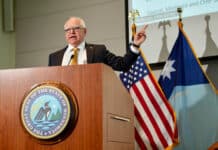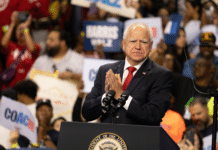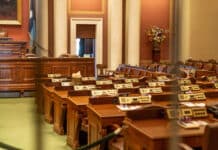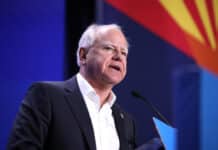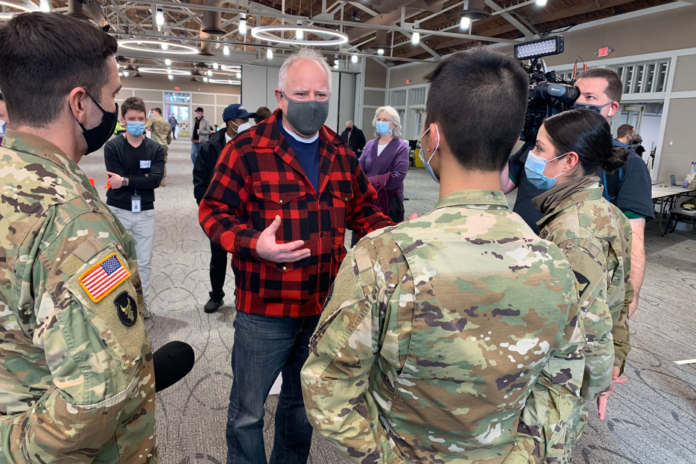
In the weeks leading up to Gov. Tim Walz’s “pause” on youth sports, state officials were privately scrambling for evidence to support the restrictions, at times admitting that “there isn’t much,” emails released Monday reveal.
“Here’s the way it should work: There is data, then there is a decision, then there is communication,” Sen. Michelle Benson, R-Ham Lake, explained at a Monday Senate hearing. “It’s not, ‘We need a message. Go find me the data that matches it.'”
Benson and her Republican colleagues published a trove of emails between state health officials and members of Gov. Walz’s staff ahead of Monday’s informational hearing.
Many of those emails were also used as the basis of an amended lawsuit filed last week against the governor by Let Them Play Minnesota, a nonprofit advocacy group that obtained the hundreds of internal emails through a public-records request.
In one email, a Minnesota Department of Health official expressed concern about the political ramifications of Walz’s pause on youth sports.
“The election, particularly the loss of six DFL seats in the House, was in part a referendum on our guidance and sports was part of that,” said Laura Oliven, who identifies herself in emails as a member of the “COVID-19 Response.”
Tarek Tomes, commissioner of Minnesota IT Services, emailed Oliven Nov. 3 with a link to a study showing youth sports have not contributed to the spread of COVID-19.
“Based on all data I have seen, spread from the actual sports competition is not one of our highest risk concerns,” Tomes wrote.
Cynthia Kenyon, an MDH epidemiologist supervisor, dismissed the study because of its “bias” and told her colleagues that “this is not the time to challenge public health recommendations that are based on good science and reasonable balances.”
In another email exchange, a sports facility operator requested information on “what the largest 3-5 drivers of spread are in the youth sports world.”
“You raise an interesting question — what data do we have to support evidence based in youth sports transmission. At this point, there isn’t much,” Jayne Griffith, a senior epidemiologist, wrote back in a Nov. 16 email — two days before the governor announced his one-month pause on youth sports.
A few weeks prior, Griffith asked several of her colleagues to clarify with a reporter that “we do not know if transmission occurred during the sports activity.”
The governor’s chief of staff, Chris Schmitter, made a similar comment in an email to MDH Commissioner Jan Malcolm.
“Thanks for this. This is helpful, though less useful than what I expected. Given these numbers are small in comparison to the overall case numbers, I assume the conclusion here is that we just don’t know where most transmission is happening?” he said in response to a request for data that “captures where most transmission is happening.”
According to one email, the governor requested data to “help articulate the need to hit a pause on youth sports.”
“Sounds like he is starting to get a lot of push back. Specifically, he is wondering if we can help connect the dots between attending a youth sporting event and then showing up for work at a [long-term care] facility, or going to the bar and then to work at LTC,” said MDH Deputy Commissioner Margaret Kelly in a Nov. 18 email, the same day Walz announced the pause.
Nicholas Kimball, a communications director, told Kelly that “leaning too heavily on the data on this front is fighting the battle on the wrong playing field.”
“If there is any data — and I’m not sure what it would be so don’t want to really suggest anything so as not to limit the thinking — it would be helpful,” he added.
Malcolm told state lawmakers during Monday’s hearing that sports “fit the profile of what is heightened risk for transmission.”
“We have had a couple of deeper investigations that we believe were pretty conclusive in terms of the spread happening during the play or during practice. But in addition, we also look to published data from the CDC and others about the documentation of transmission between participants. Not every case can be investigated to that level or researched to that level,” she said.
The hearing was called to get to the bottom of “who’s making these decisions,” a question that was left mostly unanswered.
“We needed to know why COVID decisions were motivated by politics and were contrary to data showing sports are safe. Instead, Commissioner Malcolm pretended like the emails didn’t exist, admitting political motivations for decisions about kids,” Let Them Play Executive Director Dawn Gillman said in a statement.
“As a mother, you never imagine being in a position where your child is unknowingly offered up as a scapegoat by public officials we are supposed to be able to trust,” she added. “A line was crossed and we need to ensure this never happens again.”





